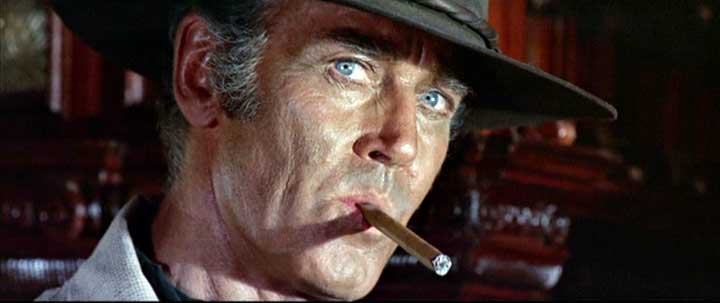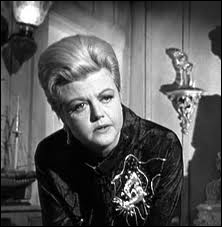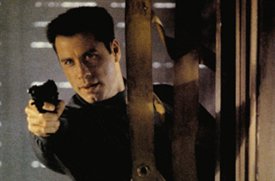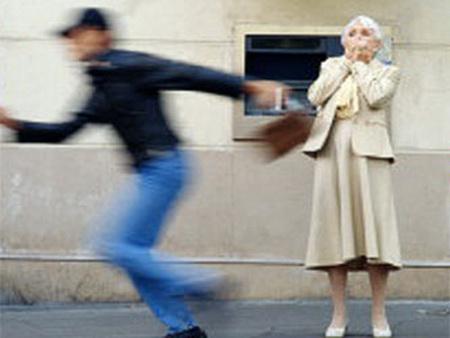by Brian Thornton
Friend and colleague Hilary Davidson is guest editing this week over at
The National Post, and she's got something up there that
EVERY SINGLE WRITER LOOKING TO SELL THEIR WORKS OUGHT TO READ IMMEDIATELY!!!
(Sorry for the shouting above. Just wanted to make sure I had your attention before I continued. Yes, it's that important.)
The post I'm referencing can be found
here.
Excerpting from her main point:
"Writers are told by their publishers that they need to be on social media, like it's some magical world that can make or break a career, but nobody tells authors what to do when they get there. Some only talk about their own work, and they don't understand why no one is listening. Here's what your publisher doesn't tell you: an author can torpedo his or her career by coming off like a jerk online."
This is something with which I have plenty of experience (dealing with writers who relentlessly and shamelessly hawk their wares online, to the exclusion of all else- not the actual hawking of said wares in such a decidedly tone-deaf manner.), and I'd like to take a moment to expand on this point.
I currently have the privilege of serving my second tour as chapter president for the Northwest Chapter of the Mystery Writers of America. Well most days it feels like a privilege...
 |
| Friend and Colleague Jim Thomsen |
|
One of the duties that comes with serving as chapter president is putting in time as an op the chapter's Facebook page. By dint of a lot of hard work on the part of the chapter's board (and most especially by our board editors Jim Thomsen and David B. Schlosser), we have an active and lively presence on Facebook: with all manner of discussions taking place on any number of writing-related topics, both specific to crime fiction and of the general variety.
Our Facebook presence is a closed group, therefore you need to apply for membership in order to join in the fun. Our rules are pretty loose: we require you have at least some association with the Pacific Northwest and an interest in crime fiction writing. We field new applications daily.
 |
| Friend and Colleague David B. Schlosser |
|
You would be surprised how many people both from inside and outside of the region ask to join, and if allowed to join, immediately begin posting the most obnoxious Blatant Self Promotion. People who do that don't remain members for long.
In an effort to combat this kind of social media group killing annoyance, all posts (except for those made by chapter board members) are filtered, and require approval from a board member/op before they go live. If everything the member posts is BSP, without a shred of showing themselves interested in connecting with other members, they get a message to that effect.
It's tough when you have actual, dues-paying chapter members who flood your group with BSP on the release of their book. I mean, hey, I get it. I've published nine books, and received pretty much ZERO publisher support (aside from payment of advances/royalties) for ALL of them.
Sympathizing with their position does not stop me from giving them polite (and private) warnings. In fact, I think of it as doing them a favor.
This is at least in part because I also well recall the early days of the internet, before Facebook or any of the rest of today's reigning social media," back when phrases like "troll" and "BSP" were newly-minted, and "social media" consisted mostly of interest-based email lists, ICQ ("I Seek You" Anyone remember that?) and Yahoo Messenger.
I would scroll through message after message of BSP intended to get people to buy they sender's wares, all of them posts that gave me not clue one about the sender, other than that they were selling something and weren't particular about whom they were soliciting in service of it.
None of it made me want to read their stuff.
Let me illustrate for you how this sort of thing is
supposed to work:
I used to be a fairly active member of the Short Mystery Fiction Society (my first fiction sales were short fiction), although my participation has fallen off over the past few years. I got to know really cool people who were also interested in short-form crime fiction. One of those folks was a literary workhorse named Michael Bracken.
 |
| Friend and Colleague Michael Bracken |
|
Michael is that rarest of jewels: a working author/editor who makes a full-time living writing/collecting/editing exclusively in the short form. Michael had an idea for a themed crime anthology with the working title of
City Crimes, Country Crimes. I heard about it through the Short Mystery Fiction Society list, and submitted something I'd been working on. My take-home for all of my fiction sales up to that point was a whopping ten bucks ($10.00).
Michael accepted the story, making a few requests for minor changes. I gladly complied. He's a really first-rate editor. I was lucky to get him to look at my work. But the publisher he had lined up to publish the anthology folded suddenly and unexpectedly, so he released the stories projected for the anthology back to their authors.
So I had this well-polished, professional short story of which I was quite proud, and no market for it.
Enter future Sleuthsayer blogmate and short fiction MACHINE, R.T. Lawton. R.T. was (and I believe, still is, although you'd have to ask him) a denizen of the Short Mystery Fiction Society, which was where I first got to know him. R.T. might have published more short pieces with
Alfred Hitchcock's Mystery Magazine than any
living author. I doubt he would make that claim, but they've published a lot of his stuff over the years, and I am happy to toot that horn for him!
As Hilary mentioned in the piece she wrote (and that I linked above), one nice thing about Social Media is that it gives you a way of "meeting" people in real life-especially at writing conferences, where so many people know nearly no one- that you've already gotten to know a bit in the virtual world.
 |
| Friend and Colleague R.T. Lawton |
So I knew R. T. from SMFS, and ran in to him at my first Bouchercon (Las Vegas). We have since become fast friends. R.T. in turn introduced me to his editor at
Alfred Hitchcock (she was also attending Boucheron), and after a large group chat in the B'con bar, I mentioned to her that I had a story that might interest her.
She proceeded to encourage me to send it, and told me how to get my name out of the slush pile. I followed her instructions, and that is how I came to publish "Counting Coup," the first short story I ever published for more than ten bucks (no mean feat, in today's market!). I've since thanks R.T. for the intro, but let me do it again here. Thanks again, pal!
I also met future fellow Sleuthsayer Rob Lopresti through SMFS. I have admired Rob's work for years, since first encountering his writing in the AHMM short "Snake in the Spring Grass." (If you haven't read it. You should.), and he's practically a neighbor- living just up I-5 (as we westerners reckon it, a hundred-plus miles is really not that far!) in Bellingham.
So when Rob approached me about writing for the Sleuthsayers blog, it was his participation (and
 |
| Friend and Colleague Rob Lopresti |
|
R.T.'s) that sold me on the experience, sight unseen. Come to find that another friend from SMFS, Eve Fisher, is also a Sleuthsayer (She is also a MUST-READ, by the way). In the intervening year or so since I joined Sleuthsayers, I've met other great writers, as well. My TBR pile truly has begun to runneth over.
Now, if reading all of the above has made you in the least bit curious about Michael's fiction work, or R.T.'s, or Rob's, or Eve's or even my own, well and good. These guys are all aces at their craft, and they really give value for their dollar. But that's not really the point of this post.
I have learned something from each of these fellow travelers that I flatter myself has made my writing better for the exposure to their work.
Michael got me thinking like a professional: asking who my intended market was, and what plan did I have to appeal to their tastes? (For those of you who disdain this sort of marketing thinking, I accept your disapproval gladly.).
R.T.'s work always gets me thinking about the importance of historical detail: how much to dole out, how much to hold back (we both writing historical mystery).
Rob got me thinking about misdirection and how to "hide the ball," so to speak, until the very end of the story, helping to make for a satisfying ending.
 |
| Friend and Colleague Eve Fisher |
|
Eve has been a wonderful resource for my current (and about to be wrapped up FINALLY!) work in progress, plus, she hides the ball better than just about anyone!
And how much do you suppose I would have gotten from any of these incredibly satisfying relationships if I'd initially approached these fine folks as if I wanted to sell them Amway?
I think everyone knows the answer to that.
So use your social media to make friends/connections, learn about/from other fellow travelers. I have found other writers for the most part to be incredibly generous with their time/interest/advice. Especially if they get to know you first, and think you're, if not, "cool," at least not trying to GET THEM TO BUY YOUR LATEST BOOK!
After all, BSP does you no good in writing groups. It's a bit like trying to be the loudest voice in the crowded gymnasium (which also works as a metaphor for trying to market your book in an age where the traditional gate-keepers had lost much of their power, and the new media aren't very helpful at all in helping authors figure out "what sells"). Everyone there likely has something to sell.
So why not focus instead on what you
can get from social media, in addition to enjoying platforms such as Facebook for what they currently are (In the case of Facebook, the land of unsolicited–though not necessarily unwanted–updates about other people's kids/grandkids/nieces/nephews/godchildren/petchildren, usually complete with a stunning photo array/any number of pithy comments/illustrations/links about all manner of facets of daily life, "free" games, and a million other potential time-wasters.), and not bother with trying to use it to help you earn out your first advance?
After all, who wants to be the modern day equivalent of the original carnival sideshow geek: someone so desperate for attention they were willing to bite the heads off of chickens in front of paying customers? That's how jamming your BSP down the collective throats of your
victims "potential customers" can all too frequently come across.
And on that note I yield the podium over to my fellow Sleuthsayers and readers of this blog: what have I left out? Are there even more uses for social media than those about which I've reminisced and which I've also laid out herein?
Brian
 |
| Friend and Colleague Hilary Davidson with some goofball. |







































